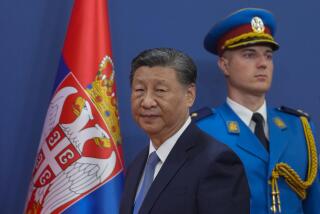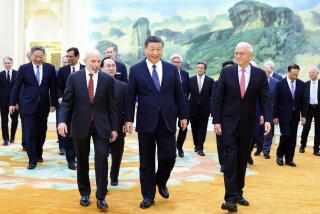China’s takeover of mega-company puts properties in U.S. and worldwide in hands of Chinese government
- Share via
Reporting from BEIJING — In his address to the UN General Assembly in 2015, Chinese President Xi Jinping took a not-so-subtle swipe at U.S. financial regulation.
As he outlined the key principles for achieving lasting world peace and prosperity, he noted one key element is “open, innovative and inclusive development” that benefits more than just the wealthy.
“The 2008 financial crisis has taught us that allowing capital to blindly pursue profit can only create a crisis and that global prosperity cannot be built on the shaky foundation of a market without moral constraints,” he said.
Xi showed what that can mean in real life this week when Chinese regulators took control of Anbang Insurance Group, a privately owned Chinese conglomerate that sprung to global prominence when it purchased the Waldorf Astoria hotel for a stunning $1.95 billion in 2014.
Still, the decision to seize control of Anbang is striking because the company is not known to have defaulted on any of its debts, though China’s insurance regulator said in a statement Friday that “there exist illegal operations at Anbang, posing threats to the company’s solvency.”
Anbang’s chairman, Wu Xiaohui, has been indicted on suspicion of economic crimes, said regulators, who added that a group of government agencies will take control of the company’s board and management for one year.
Officials will “actively introduce high-quality social capital to Anbang, restructure its shareholding and keep Anbang as a private company,” the statement said.
Wu was known as one of China’s ambitious, politically connected tycoons whose companies incurred extraordinary debt while snapping up prestigious foreign assets. But it was enough debt, regulators believed, to potentially destabilize the country’s financial system. Last year, the Chinese government began cracking down. Authorities detained Wu in June, and he hasn’t been heard from since.
Wu took Anbang on a global shopping spree that started off with a bang when it purchased the Waldorf, the famed New York hotel synonymous with luxury. It went on to acquire other financial and real estate assets, including Strategic Hotels and Resorts. The portfolio of 15 luxury properties, including Loews Santa Monica, was acquired for $6.5 billion in 2006.
The insurer also wanted to buy the Hotel del Coronado, which was part of the Strategic portfolio. But it was removed from the deal after opposition from U.S. national security officials who cited the historic hotel’s proximity to the San Diego naval base, Bloomberg News has reported. Anbang also owns insurance companies in Europe and Asia.
Authorities have chastened similar companies, which have struggled financially in recent months, among them HNA Group. It owns several airlines, a 25% stake of Hilton Worldwide and several tourism and logistics companies, has an estimated $90 billion in debt, and has sought to raise capital from its own employees. Dalian Wanda is another. It is a real estate giant that owns AMC Cinemas and plans to sell its last two overseas property developments, including one in Beverly Hills.
Still, the focus on Anbang surprised many financial industry observers.
“Why Anbang right now, and not HNA? I don’t know,” said Anne Stevenson-Yang, research director at the China-focused J Capital Research. “Anbang hasn’t defaulted on anything, and HNA has. I think Anbang’s holdings in the banks, and the banks’ outstanding loans to Anbang, are a critical portion.
“I don’t know what’s going on right now, but the Chinese financial system is obsessed with the possibility of a financial crisis,” she continued. “So you can’t allow a company like Evergrande [China’s second-largest property developer], or even HNA, to default because you don’t understand what the collateral damage will be.”
However, there were reports that Anbang’s source of funding for much of its recent financial growth worried Chinese regulators.
The company sold short-term, high-yield products that were used to fund purchases of long-term assets such as real estate, creating a mismatch in duration. One of its products, called Anbang Longevity Sure Win No. 1, boosted its premiums almost 40-fold in 2014 and offered some of the highest yields in the industry.
Wu was extraordinarily politically connected. He married a granddaughter of Deng Xiaoping, China’s top leader in the 1980s. Yet experts say his woes may mean he’s fallen out of favor.
President Xi, in power since 2012, has tightened Communist Party control over private enterprises, to stabilize the financial system and crack down on capital flight.
“There is one way to read this, which is that China’s problems are much more severe and more different than people thought, so the Chinese state is taking action,” said Fraser Howie, the author of “Red Capitalism: The Fragile Financial Foundations of China’s Extraordinary Rise.” “But you can also put a positive spin on that: Here’s a government that’s willing to act, and act boldly. That gives us confidence that they’ll do so in other scenarios.”
He emphasized the regulators’ assurance that Anbang will remain private. “Look at it this way — you’re on a bus, and the driver’s drunk,” Howie said. “You seize control of the wheel, but you still don’t own the bus. That’s what the regulator’s doing here.”
Anbang’s office in Hong Kong did not immediately reply to a request for comment.
Wu grew up in southeastern China’s Zhejiang province. According to a 2016 New York Times report, he worked as a car salesman and a low-level anti-smuggling official.
Anbang started in 2004 as an auto insurance company and moved into life insurance in 2010. It rapidly developed into a financial giant, with assets of about $300 billion. It is China’s second-largest insurer in terms of life insurance premiums, Bloomberg reported.
Wu ran the company under a Byzantine ownership structure, making its true owners — and his own wealth — difficult to discern.
“Anbang is too big to fail,” an unnamed senior executive from the company told the Financial Times. “Even though it has no real value, they will have to restructure it very carefully.”
Before his fall, Wu had found a comfortable place among the global elite. He made deals with the private equity group Blackstone; last year, he was involved in failed talks with President Trump’s son-in-law, Jared Kushner, over a property development in Manhattan. In 2015, he gave a talk at Harvard University, in which he pondered his place in the universe.
“Our troubles are truly very, very small,” he said, according to the Standard, a Hong Kong newspaper. “Once you’ve thought through things clearly, there is no trouble left. At the end of our life, we return to zero, so you absolutely must enjoy the journey.”
Bloomberg news, Assistant Business Editor Laurence Darmiento and special correspondent Kemeng Fan contributed to this report
For more news from Asia, follow @JRKaiman on Twitter
UPDATES:
Feb. 24, 7:32 a.m.: This story was updated to delete the term “gray rhino” in reference to Wu Xiaohui.
This story was originally published Feb. 23 at 8:55 a.m.
More to Read
Sign up for Essential California
The most important California stories and recommendations in your inbox every morning.
You may occasionally receive promotional content from the Los Angeles Times.









